<第一部 Part 1>
<第二部 Part 2>
Science Agora opened as it celebrated its 10th anniversary. Guests gave greeting speeches and Professor Dame Anne Glover from the University of Aberdeen, the United Kingdom, gave a keynote lecture in the first part of the event.
<第一部 Part 1>
開幕セッション第一部は、「異なる分野、セクター、年代、国籍のリーダーを来賓として招待し、今年で第10回を記念するサイエンスアゴラの目指すビジョンを共有する」ことを目的として開催されました。
The Opening Session Part 1 was held in order “to invite leaders from various fields, sectors, generations and national backgrounds as guests, and to share the vision of Science Agora which celebrated its 10th anniversary this year”.
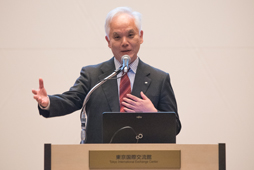
開幕に当たって、主催者を代表し科学技術振興機構(JST)理事長・濵口道成氏があいさつ。まず、「サイエンスアゴラ」という名前の由来を紹介し、「アゴラ」は広場を意味する古代ギリシャ語であり、この場を、市民も専門家も、みんなが一緒になって科学の持つ力と可能性について話し合う広場のような存在にすること、そして科学と社会をつなぐことを狙いにしていると説明しました。
Dr. Michinari Hamaguchi, President of Japan Science and Technology Agency (JST), gave an opening speech as a JST representative. He first introduced the origin of the event name "Science Agora." He explained that the event was named after the word "Agora" meaning an open forum in Ancient Greek, for the purpose of making this a place where citizens and experts would get together to discuss the potential of science, and aims to create a link between science and society.
濵口氏は、1999年の世界科学会議の「ブダペスト会議」で宣言された科学の4つの役割について言及。科学の役割の一つ目は「知識のための科学」、2つ目は「平和のための科学」、3つ目は「開発のための科学」、そして4つ目は「社会における科学と社会のための科学」であると紹介しました。東日本大震災による科学への信頼の揺らぎがあったことにより、4つ目の「社会のための科学」の重要性が世界的に見ても強調されていることを引き合いにしながら、サイエンスアゴラを「科学がもたらす幸福で希望の持てる未来について、みんなが一緒になって考え、対話し合う場にしたい」という言葉で締めくくりました。
Dr. Hamaguchi also mentioned four roles of science declared in the World Conference on Science in Budapest in 1999. The roles are: "science for knowledge”, “science for peace”, “science for development” and “science in and for the society.” He discussed that the importance of the fourth role of “science in and for the society” became greater worldwide as trust in science was undermined since Great East Japan Earthquake in 2011. He concluded his remarks in hopes of "making Science Agora the place where everyone is involved in thinking about and having a dialogue on the happy and bright future that science can bring."
来賓のあいさつでは、まず、内閣府特命担当大臣(科学技術政策)・島尻安伊子氏(代読:内閣府政策統括官(科学技術・イノベーション担当)・森本浩一氏)が、「今後は、イノベーションを担う多様な人材による双方向での対話及び協働、共創という観点がこれまで以上に重要になる」との認識を示し、「サイエンスアゴラの取組は、まさにこうした認識に合致するもの」であると述べました。
Mr. Koichi Morimoto, Director General for Science, Technology and Innovation, Cabinet Office of Japan shared the message on behalf of Ms. Aiko Shimajiri, Minister of State for Science and Technology Policy). In her message, she presented the approach that the interactive dialogue, collaboration, and co-creation among a diverse population would become more important than ever in the future and also emphasized that the activity of Science Agora coincides with such approach.
文部科学省文部科学大臣・馳浩氏(代読:文部科学省文部科学審議官・戸谷一夫氏)は、科学技術が社会に広く浸透し、国民の生活に大きく影響している状況下、「サイエンスアゴラが科学技術に対する意識の広まりを促進する機会になることを期待する」と述べました。さらに、日本経済団体連合会未来産業・技術委員会委員長・KDDI株式会社取締役会長・小野寺正氏は、「世界では、IoT(Internet of Things)、人工知能、ロボット等を活用した、いわゆる第四次産業革命がある。企業はオープンイノベーションにより、そうした革新的な技術を開発し、社会実装によって経済社会へと還元することが求められている。オープンイノベーションや革新技術の社会実装といった取り組みには、産官学、国民といった幅広いステークホルダーの相互理解が必要不可欠である」とした上で、「サイエンスアゴラが、さまざまなステークホルダーの間で、認識を共有し議論を深める場となることを期待する」と述べました。
Then Mr. Kazuo Todani, Deputy Minister of Education, Culture, Sports, Science, and Technology, read a message on behalf of Mr. Hiroshi Hase, Minister of Education, Culture, Sports, Science and Technology. Science and technology are prevalent and have a greater impact on people's life; "I hope that Science Agora would be an opportunity to increase the public awareness of science and technology", said the Minister in his message. Mr. Tadashi Onodera, Chairman of the Committee on New Industry and Technology of Keidanren (Japan Business Federation) and Chairman of KDDI CORPORATION said, "The world is now in the Fourth Industrial Revolution using IoT (Internet of Things), artificial intelligence, and robots. Corporations must develop those revolutionary technologies through an open innovation and is expected to make a return to the economic society by a societal implementation. Industry, government, and academia, citizens, and other stakeholders must have a mutual understanding of open innovations, societal implementation of revolutionary technologies, and other initiatives.” He also mentioned, "I hope that Science Agora becomes a place to share perspectives and hold discussions in depth between the different stakeholders."
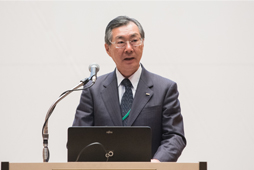
日本学術会議会長・大西隆氏は、「日本学術会議の目的は科学の向上・発達、さらに行政・産業や国民生活に科学を反映させることを目的としている」とした上で、「科学者が社会に対する責任意識を持ちながら市民と対話し、科学の発達を担うことが重要である」と語りました。最後に、日本学生支援機構理事長代理の髙橋宏治氏(代理:国際研究交流大学村村長:遠藤勝裕氏)は、「知の国際交流の拠点として、この東京国際交流館を活用いただくことに感謝するとともに、実り多い記念行事となることを祈念したい」と述べました。
Dr. Takashi Onishi, President of Science Council of Japan, stated, "Science Council of Japan aims to improve and develop science, and to reflect it on government, industries, and people's lives." He then added, "It is important for scientists to have a dialogue with citizens with a mind of social responsibility and lead the progress of science." Lastly, on behalf of Mr. Katsuhiro Endo, Superintendent of Tokyo Academic Park, Mr. Koji Takahashi, Executive Vice President of Japan Student Services Organization, said, "We would like to express our gratitude for choosing the Tokyo International Exchange Center as an intellectual hub of international exchange and we pray for this to become a successful anniversary event.”
続いて、アバディーン大学教授、アン・グローバー氏の基調講演が行われました。グローバー氏は「科学というものは最終的に人に伝えなければ科学をやる意味はない」と強調した上で、科学によるイノベーションが社会を大きく変革してきた社会的・歴史的背景から、科学を専門家から市民へと伝え、また科学に対して理解のある市民を育てていく必要があることを訴えました。
Next, Dame Anne Glover, Professor at the University of Aberdeen, gave a keynote lecture. She emphasized, "Science is meaningless if it is not communicated to the people." She then explained the social and historical contexts of how scientific innovations have transformed society, and told the audience that it is necessary for experts to inform citizens on science, and create citizens who understand it.
また、科学の持つ可能性として、「科学という共通言語」を用いることで世界中の研究者が一つの研究課題に協力する可能性、またそれが外交に発展する可能性を指摘。さらに科学的知見が政策決定、国際的問題の発見と解決のための国際法の制定に至る可能性などがあることを挙げました。
Prof. Glover also pointed out that science could bring together all scientists around the world to work on the same research topic using science as a common language, which could also develop into diplomacy. Furthermore, she mentioned that scientific knowledge could contribute to making policies and international laws to identify and solve global issues.
一方で、世界の複雑化、変革速度の高速化などを背景に、「国際的に科学への市民の支持は低下している」と危惧。この解決のためのポイントを2つ挙げ、一つは科学者と市民とのコミュニケーション、もう一つは、イマジネーションを豊かにし、科学が実現するであろう世界の未来を想像することだ、と指摘しました。
On the other hand, Prof. Glover warned that citizen’s support on science is declining on the global level as the world has got more complex and it has been changing rapidly. To address this challenge, she pointed out two things: One was communication between scientists and citizens, and the other was imagining the world's future that science would realize.
このように、グローバー氏は「科学とは未来を作れる営みであり、常に市民に考えるきっかけを与えていく必要がある。それによって我々専門家もまた考えるきっかけを得ることができる。この双方向対話によってよりよい世界を作っていく」と締めくくりました。
Prof. Glover concluded that "Science is the activity that has a potential to create the future, and it always needs to inspire the citizens. By doing so, it can become a starting point for thinking to us science experts. This two-way dialogue can help make the world a better place."
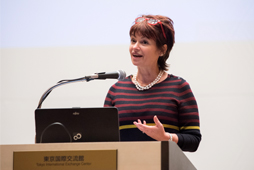
一部の最後に、科学技術振興機構上席フェローの大竹暁氏が、開会を宣言しました。大竹氏からは、今年は大きなテーマとして「つくろう、科学とともにある社会」を設定し、その下に3つのテーマ、「国際光年」「サイバー社会」「2020年の社会」を掲げたと紹介した上で、「このサイエンスアゴラを通じて、前向きに、未来に向かって議論をしよう」と締めくくりました。
At the end of Part 1, Mr. Satoru Ohtake, Principal Fellow of Japan Science and Technology Agency (JST) declared the opening of Science Agora. He introduced that there were three sub-themes "International Year of Light", "Cyber Society" and "Society in 2020", under this year's main theme, "Building a Society Harmonized with Science." He concluded by saying, "Let’s discuss positively toward the future at Science Agora."
<第二部 Part 2>
第二部は、特別講演とパネル討論で、先端科学技術と社会の関わりに関する洞察の共有を目的に行われました。
The session Part 2 consisted of a special lecture and a panel discussion to share insights on the relationship between cutting-edge science and the society.
まず、2014年に青色発光ダイオード(LED)の発明によってノーベル物理学賞を受賞した天野浩氏が、「青色LED研究に見る日本の大学の社会貢献のためのこれからの方向性」という題で特別講演をしました。
First, Dr. Amano, who received Nobel Prize in Physics for innovating blue light-emitting diode (LED) in 2014, gave a special lecture, titled “A lesson from blue LED research regarding Japanese universities contribution to the society and the way forward."
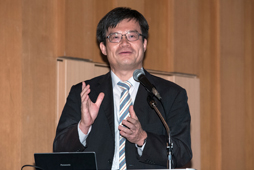
天野氏は、まず青色発光ダイオード(LED)開発の経緯を語った上で、その中で長く成功しなかった研究に対し、絶えまぬチャレンジを続け、また産業界においてその可能性に目をつけてくれた人がいたことが今回の成功の理由であること、加えて、特に研究室の自由な雰囲気や、教授も学生も対等の立場で議論ができたことが自分を成長させる基盤になったと振り返りました。
He first explained the process of developing LED and then reflected that his success derived from the people who saw the potential of his long and intense research in the industries as well as his attitude to continue his studies even after failed attempts. He could also learn and grow thanks to the open atmosphere in the laboratory that enhanced discussions with professors and students on even grounds.
このことから、研究の活性化とその産業化には次の3つが重要であると指摘しました。それは第1に、「長い取り組みを許容するタイムスケール設定」、第2に「成果を実用化につなげるための研究者本人が社会にアピールする力」、第3に「研究を行うにあたっての、自由な雰囲気と議論」。
From this experience, he pointed out three key elements for vitalizing and industrializing research. The first was "setting a time scale that allows a long-term commitment", the second was "advocacy by researchers themselves to the society to link research achievements and practicality", and the third was "open atmosphere and discussions while conducting research."
さらに、日本の社会にはシーズ(企業が新たに開発することによって,消費者に提供されるようになる技術・材料・サービス)や技術はあるもののビジネス化に対する取り組みが不十分であり、大学改革の必要性がビジネス化においても重要であると前置きした上で、大学のグローバル化、女性の活用、若手の雇用を促進すべきだ、と話しました。
He also mentioned that Japanese universities have seeds (skills, materials, and services that companies newly develop to provide consumers) and technologies, but the efforts for commercialization are insufficient and that universities need to transform to commercialize such seeds. It is also necessary to globalize universities, unlock women’s potential in the workforce and recruit young people.
また、地球規模で問題になっていることとして、地球の扶養限界を超える人口増加による食糧問題や水のアクセスや衛生問題、電力やエネルギーの問題、および情報ネットワークの増加による消費電力の見通しなどを挙げました。その上で、日本が「課題先進国としての自覚を持つこと」「日本ならではの課題解決法を提示すべきである」とし、それに向けた新しい取組が必要であると訴えました。
He also mentioned the following global issues: population growth beyond Earth's capacity creating food, access and quality of water, issues related to electricity and energy, and an outlook on the electricity consumption due to an increase in information networks. He then stated that Japan would need "To be aware of itself as an advanced country facing such issues ahead of others." and "must propose Japan’s unique solutions to these issues." Dr. Amano stated that Japan was in need of developing new initiatives in order to move forward.
続いて、「サイバー社会と人間 ~REALITY2.0とこれからの社会~」と題したパネルディスカッションに移りました。ファシリテーターは政策研究大学院大学教授の有本建男氏が担当。まずはパネラーごとに、自己紹介を兼ねたショートスピーチを披露しました。
It moved on to a panel discussion titled “Cyber society and human beings – REALITY 2.0 and the society going forward” facilitated by Mr. Tateo Arimoto, Professor at National Graduate Institute for Policy Studies (GRIPS). It began with short introductions by each presenter starting from Dr. Kazuo Iwano, Principal Fellow at Center for Research and Development Strategy, Japan Science and Technology Agency (JST).
最初はJST研究開発戦略センター上席フェローの岩野和生氏。岩野氏は「社会産業変革に寄与する情報科学社会」と題して、物理社会とサイバー社会が一体化して一つの実体を作る「REALITY2.0」という概念を紹介した後、「この社会の中では社会におけるあらゆる機能が呼び出し可能となり、価値創造の形が変化するため、さまざまな概念のアイデンティティーが根本的に変わるだろう」と述べ、「国、市民、産業など全てのセクターが参加して将来の価値観と社会観の展望の形成が必要である」との見解を述べました。
Under the title of "Information Technology Society that Contributes to the Industrial Revolution in the Society", Dr. Iwano first introduced the concept of "REALITY 2.0", a new reality created by inseparable fusion of physical and cyber societies. "In such society, any social function can be accessible via a protocol like API (Application Programming Interface), and the way to create values would change; therefore, identities of various concepts will fundamentally change, and all the sectors, including government, citizens, and industries, will need to take part in creating values and a definition of society in the future," said Dr. Iwano.
次は内閣府総合科学技術・イノベーション会議議員の久間和生氏。「サイバー社会における産業構造の変革と科学技術イノベーション政策」と題し、サイバー社会の到来によりICT(情報・通信に関する技術)をベースとしたイノベーションの創出が必須であること、それによって日本は、これまでの物理や化学をベースとした強い産業をより強くすることに加え、ICTを用いた新しいシステム・サービス産業の創出が重要になると述べました。その上で、「第5期科学技術基本計画では世界に先駆けた“超スマート社会”の実現を掲げており、社会に新しい価値を生むシステムとそれを支えるプラットフォームを構築する必要がある」と語りました。
Dr. Yuichiro Anzai, President of Japan Society for the Promotion of Science, gave a presentation on the theme "Cyber Society and Human Beings - REALITY 2.0 and Society Going Forward," and introduced his research on artificial intelligence. He said, "The key in this panel discussion is whether many of us can feel and share REALITY 2.0."
さらに、日本学術振興会理事長の安西祐一郎氏は「サイバー社会と人間~REALITY2.0とこれからの社会~」というテーマでスピーチ。自らが人工知能の研究に携わっていたことを紹介した上で、「今回のパネルはREALITY2.0を多くの人が体感できるか、共有できるかがポイントである」と述べました。安西氏は、これまで技術の問題ではなかった思考力、判断力などといった「心の世界」にICT技術が進出する社会が到来することを予言。REALITY2.0が将来は新たなビジネスチャンスをもたらすと共に新たな問題をもたらす可能性があることも指摘し、「科学技術と社会の関係について、誰もが考えることが重要である」との見解を述べました。
Dr. Anzai predicted that ICT would contribute to one's thought and judgment, or “the realm of minds” which were not in the scope of technologies in the past. He also pointed out that REALITY 2.0 could potentially bring both new business opportunities as well as problems. "It is important to make sure for everyone to think about the relationships between science, technology, and the society."
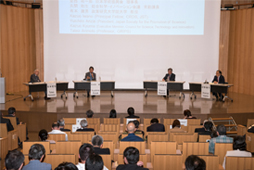
有本氏は、REALITY2.0は社会全体のイノベーションであり、AAAS(アメリカ科学振興協会)をはじめ、世界的に議論が行われているとした上で、「この問題を小さな科学コミュニティーだけではなく、どのようにして産官学が共有できるか」「さらにこのイノベーションを担うであろう人材の確保についてどうするか」という2つの問いをパネラーに投げ掛けました。
Mr. Arimoto mentioned that REALITY 2.0 has been discussed globally including in American Association for the Advancement of Science (AAAS), as it was an innovation on all aspects of society. He then asked other presenters following two questions: "How can government, industry and academia share this issue beyond a small scientific community?", and "How can people who will be in charge of this innovation be secured?"
これに対して安西氏は「REALITY2.0による技術革新を社会にどのように還元するかという感覚を共有する時代」、久間氏は「ICT化の進展は応用分野によって異なるため、第5期科学技術基本計画では、ものづくりや交通、エネルギーなど、今まさに必要で他のシステムにも影響を与える分野から推進するとともに、プラットフォームを構築すべきである」と述べました。岩野氏は「ICTの発達に即して社会の機能全体がエコシステムとして分解可能かという課題がある」と総括しました。
Dr. Anzai responded, "This is the era where people share ideas of how to contribute the technological revolution by REALITY 2.0 to the society." Dr. Kyuma commented "The degree of ICT progression depends on the field. In the Fifth Science Technology Basic Plan, we must begin from manufacturing, transportation, energy, and other necessary fields that have influences on other systems and build a platform.” Dr. Iwano summarized by saying, "There is an issue on whether all functions of society can be separated, and break in line with the development of ICT, as an ecosystem."
有本氏が提示した第2のポイント「人材の確保」について、安西氏は「大学の、とくに理工系の中に新しい産業構造が確立されないままにきたことが問題である」と指摘した上で、「教育において、国内外の諸問題をはじめとする答えが見えない問題を扱っていくべきである」と提案。久間氏は企業の人材について、「ICTを理解し、社会に新たな価値を生み出せる人材は少ない」と危惧した上で、「工学部の学生も人文科学や、社会科学を学び、社会のため、人間のための科学技術を考える必要があるのではないか」と述べました。さらに安西氏は若手人材を取り巻く環境が問題であると指摘し、「自分の道を貫くことを許容する文化、社会が必要である」と強調しました。
Regarding Mr. Arimoto's second point, "securing human resources," Dr. Anzai noted that "The problem is the new industrial structures have not been developed in universities, particularly in the science and technology schools." He then proposed, "Problems without clear answers, such as Japanese and global issues, should be included in our education." Dr. Kyuma expressed his concern regarding human resources in companies, "There are only a few people who understand ICT and create new social values." He then suggested, "Engineering students need to take humanities and social science as well as science and technology courses to think of science and technology for the society and the people.” Furthermore, Dr. Anzai pointed out the problems in the environment surrounding young people and emphasized that "We need to develop a culture or a society that allows people to do what they want to do.”
最後に、パネラー全員から一言ずつ発言。岩野氏は「REALITY2.0は究極的には人と機械の融合をもたらすものであり、新しい世界を創る。そのためには大いに議論することが必要である」。久間氏は「産学官が連携し、日本の物理・化学系のような強い領域をより強く、情報系のような弱い領域を強化する必要がある。チャレンジ精神と人材の確保が重要である」。安西氏は「一人一人が伸び伸びと自らの道を実現できる社会の方向性が求められる」。そして有本氏は恩師である猪瀬博氏がインターネットの実現に際して予言的に述べた言葉―「いい意味でも悪い意味でも近代社会の枠組みを大きく壊す」を紹介してパネルディスカッションを締めくくりました。
Finally, each presenter made final remarks respectively. Dr. Iwano said, "REALITY 2.0 ultimately merges human beings and machines; therefore it creates a new world. Therefore, extensive discussions like one done today are necessary." Dr. Kyuma said the following, "The government, industry and academia must coordinate and further improve Japan’s advanced physical and chemical fields of study while working on information sciences and other fields that are less advanced in Japan. In order to do so, challenging spirit and securing human resources are important." Dr.Anzai said, "Society needs to encourage every individual to follow his/her own path." The panel discussion was concluded with the words by Mr. Arimoto's former teacher, Dr. Hiroshi Inose who predicted the impact of the internet: "Internet will destroy frameworks of a modern society in both positive and negative ways."
科学者と市民の未来志向型対話の場としてのサイエンスアゴラの役割の再確認と、大規模な社会的価値創造の変革をもたらすREALITY2.0の可能性を検討した本セッションは、サイエンスアゴラ10周年の開幕を飾るものとして非常に有意義かつ重要なテーマを扱ったものでした。後者は近未来的に科学技術が基本的な社会構造の大規模変化をもたらす非常に重要な概念であり、トランスサイエンス問題として多様な背景の人材による議論を必要とすると感じました。(江頭真宏)
This session that recognized the role of Science Agora as a forum of future-oriented dialogues for scientists and citizens, and discussed the potential of REALITY2.0 that could lead to a great revolution of social value creation. I felt that the latter was an essential concept that suggested science and technologies could bring enormous changes in the fundamentals of social structures and would require discussion as trans-science issues among people with various backgrounds. (Mahiro Egashira)